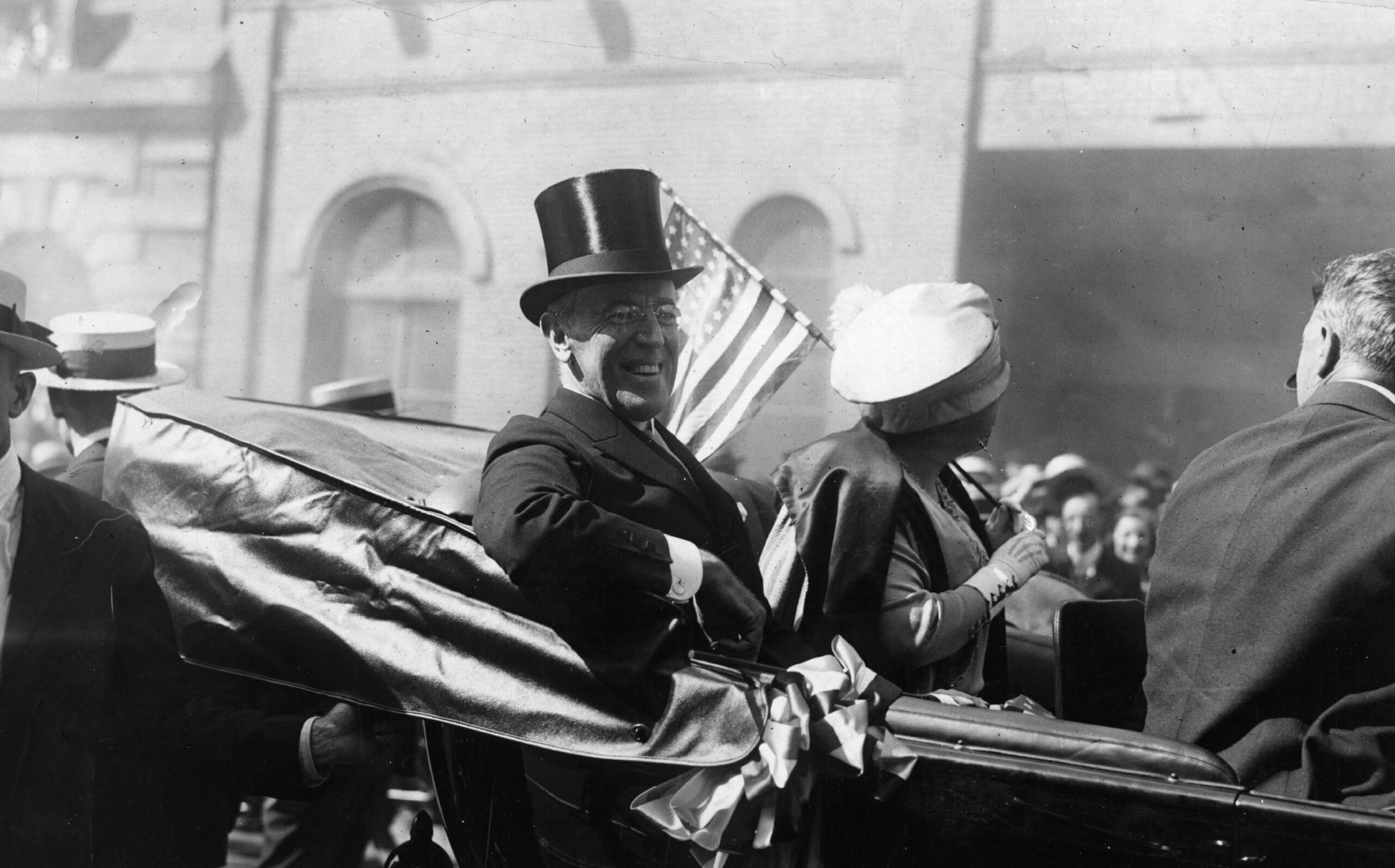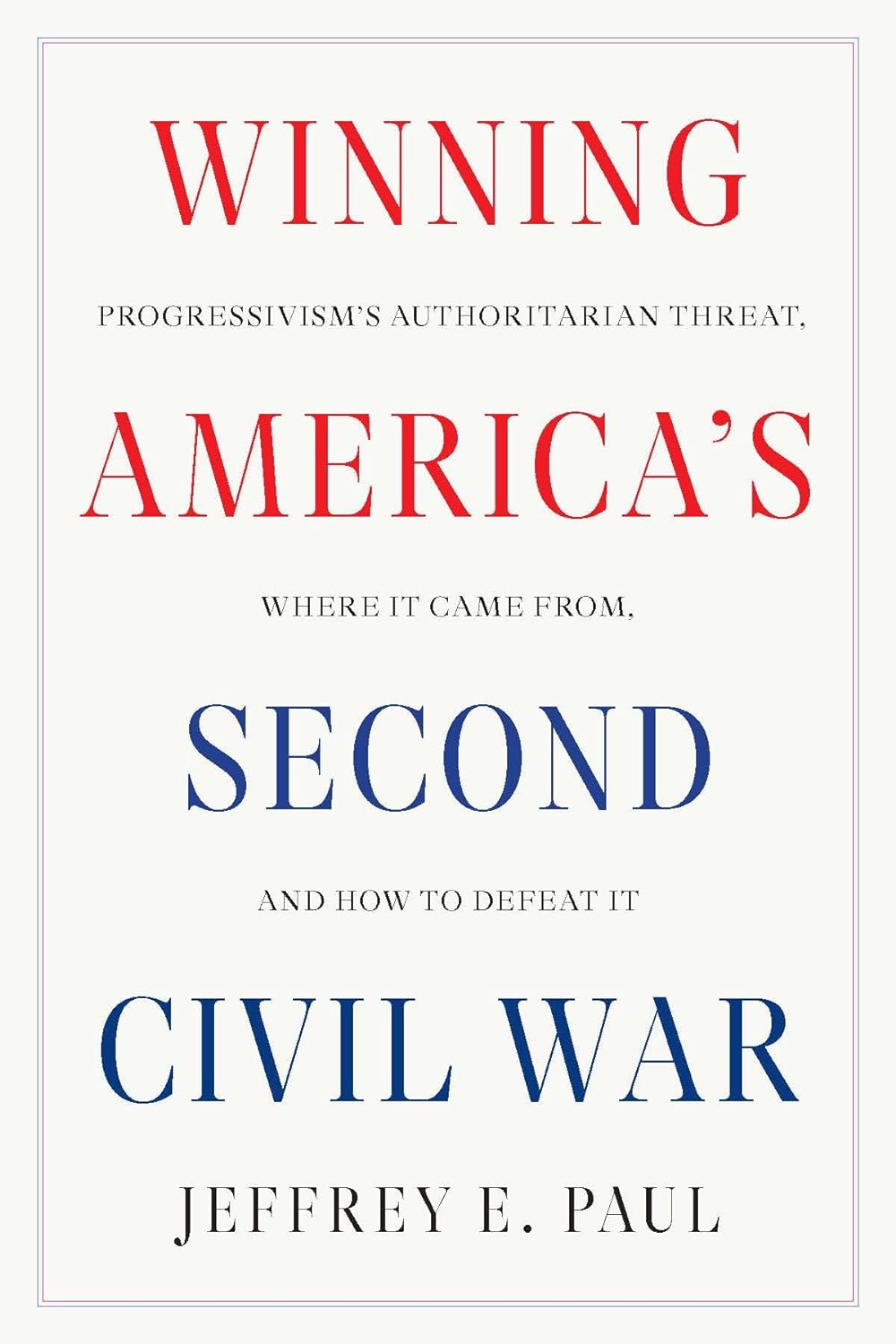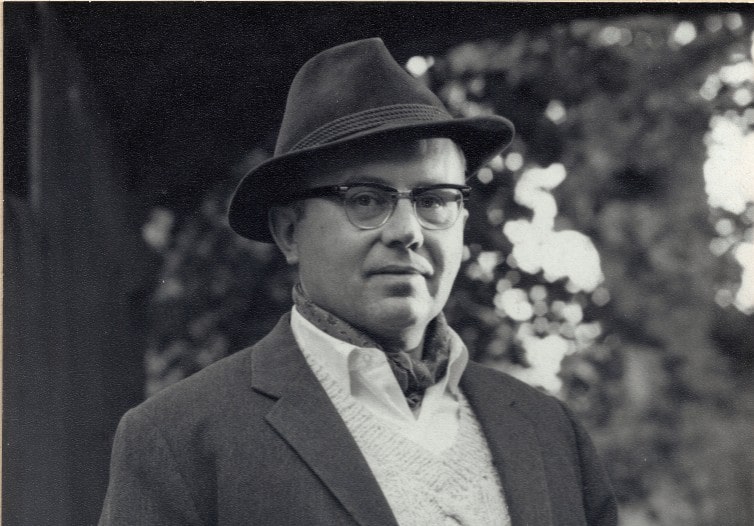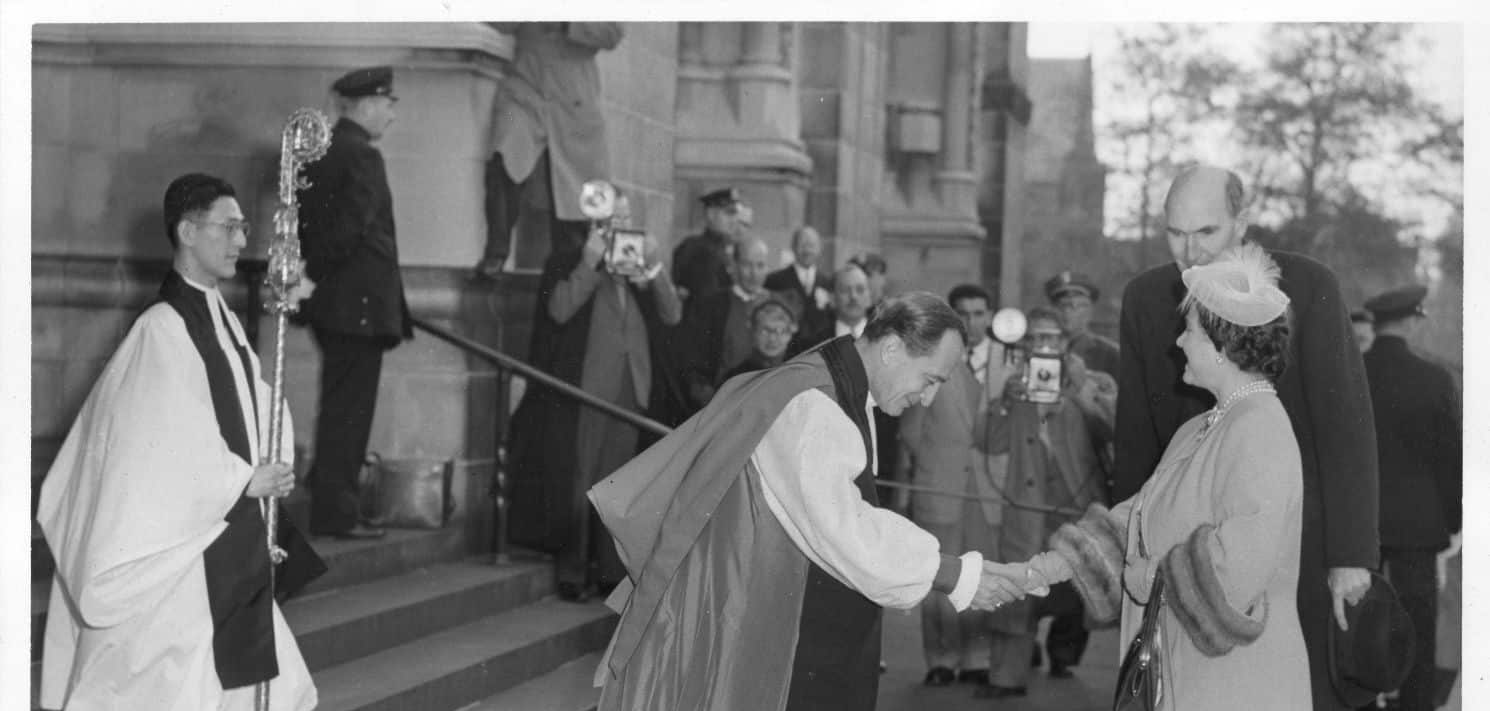In Winning America’s Second Civil War, Jeffrey Paul, a research professor in the Social Philosophy and Policy Center at West Virginia University, offers an account of the origins of what he calls America’s “two civil wars”—the first, well-known one arising from the slavery controversy, and the second emerging in 2016, when, he claims, Democrats illegitimately used their powers in an effort to determine the outcome of the presidential election. The crucial issue in that election was progressivism, over which, according to Paul, the two parties’ disagreement was no less “irreconcilable” than it had been in 1860, and the latter of which ultimately derived from the central principle that animated the former controversy.
Most readers, I believe, will regard Paul’s claim that 2016 marked the start of a new “civil war” (citing the Durham report on how Biden supporters used the phony Steele dossier and other tricks to try to prevent Donald Trump’s election) as overblown. But Paul’s book is far more interesting than that initial, partisan claim. Its significance lies rather in its exposure of the long-term roots of the transformation in Americans’ self-understanding from its founding liberalism into a pernicious progressivism, a shift that has alienated us from the original, estimable, principles of our political regime.
Paul offers an in-depth account of how the Founders’ liberalism (in the original sense), rooted in John Locke’s teaching that the purpose of government is to secure all individuals’ equal, inalienable rights, was replaced by progressivism. That doctrine originated late in the eighteenth century in the influence of German historicist thought, a movement antithetical to Lockean principles. The rise of American progressivism, as Paul explains, resulted from the education that leading American scholars who studied politics, economics, and sociology in Germany, and who subsequently founded America’s original research universities (including Johns Hopkins, Columbia, Chicago, and Wisconsin), then transmitted to their students, including a young Woodrow Wilson.
Paul’s first chapter summarizes the grounding of the American Revolution, including the Declaration of Independence, in Locke’s historically novel doctrine of natural rights, based on the principle that each human being is his own “owner”—rather than the property of earthly or even divine rulers. That doctrine, as abolitionist leaders such as Frederick Douglass recognized, is ultimately what underlay the North’s opposition to the extension of slavery and thus led to the Civil War, in opposition to the attempt by Southern apologists for slavery such as John Calhoun and George Fitzhugh to legitimize the “peculiar institution.”
Remarkably, as Paul recounts, despite the North’s triumph in the Civil War and the end of American slavery, the postwar period witnessed a “counterrevolution” against the principle of natural rights, under the influence of German historicism (which in turn originated, I note, in the Hegelian reaction against the “abstract” Rousseauian doctrine of radical natural equality that had inspired the French Revolution and its resultant anarchy). Historicism denied not only Rousseau’s claims but the existence of all transcultural/transnational doctrines of natural right, such as the Lockean teaching embodied in America’s Declaration of Independence, claiming instead that the true standards of political right for each nation were to be found in its distinctive historical development. Georg W. F. Hegel and his nineteenth-century successors (prior to Friedrich Nietzsche) viewed history as an inherently progressive process, culminating (in his account) in the actualization of a law-based state that respected the equal rights of all citizens, but that subsumed them under the good of the national community rather than authorizing any appeal to notions of inherent or inalienable rights that set limits to government’s authority. Their doctrine also posited the unequal advance of different nationalities towards history’s culmination.
By 1903 Charles Merriam, the first professor in the University of Chicago’s political science department, observed that the Founders’ “individualistic ideas” of natural rights had been “discredited and repudiated,” citing as their replacement the view of John W. Burgess (who established Columbia’s graduate program in political science) that “the state,” rather than nature, was the true “source of individual liberty.” Similarly mirroring German principles, Merriam modified the rule of equality before the law, holding instead (eerily echoing Calhoun) that the extent of liberty to which people are entitled depends on their “degree of civilization” and concluding that in a multiethnic state, the “Teutonic element” must remain supreme, while “barbaric races” that prove incapable of civilization must be “swept away.” (This principle was mirrored in the Virginia-born Wilson’s racist policies as president, including the introduction of segregation into the federal civil service—awareness of which led only recently to the removal of the former “liberal” icon’s name from Princeton’s graduate school of public affairs.)
In his third and fourth chapters, Paul traces the influence of the newly formed graduate programs in social science at Columbia and Johns Hopkins, respectively, in undermining belief in natural rights and with it the notion that government’s purpose and scope should be limited to securing those rights. At Columbia, Burgess, following his German mentors, dismissed natural rights in favor of a comprehensive notion of government’s sovereign power as “original, underived,” and “unlimited.” But in response to critics who accused him of thereby betraying America’s heritage, he still asserted his commitment to the U.S. Constitution, including its limits on federal authority along with the separation of powers, based not on any natural foundation but simply on their historically demonstrated tendency to enhance individual freedoms.
Two of Burgess’s most influential appointees to Columbia’s political science department moved further away from that commitment. The economist E. R. Seligman denied the existence of any “fixed moral boundaries to government powers,” holding that “the highly educated” were “entitled to formulate the rules” for others to obey—as they appeared to do in Germany. In particular, he denied that taxes should be proportioned to what individuals produced, since in civilized society, no one “produces” anything himself, but rather “society . . . holds a mortgage on everything that is produced,” with the only justification for private property being its “social utility.” (Here Seligman anticipated John Rawls’s theory that the products of individuals’ labor and talents should be regarded as a “common asset” to redistributed as the spokesman of “society” wish.) By contrast, Burgess, inconsistently with his premises, was appalled when the Sixteenth Amendment, authorizing progressive income taxation, was adopted, since it “made waste paper” of individuals’ constitutional rights.
Sharing Seligman’s elitism, another Burgess appointee, Frank Goodnow, the first president of the American Political Science Association and subsequently president of Johns Hopkins, not only rejected Locke’s principle of self-ownership but dismissed the notion of individual rights as inconsistent with “modern life.” Along with Seligman and (beginning in his academic years) Wilson, Goodnow favored government by experts (a harbinger of today’s “administrative state”).
Turning to Columbia, Paul first cites the distinguished Cornell historian Herbert Tuttle (to whom he dedicates his book) for presciently warning in 1883 of the Germanization of American higher education and emphasizing the opposition between the socialist doctrines espoused by German academics and America’s founding ideals. The German theory, Tuttle observed, “assumes . . . the ignorance of the individual and the omniscience of the government” and maximizes the latter’s independence from the influence of elected legislatures and public opinion. Its application, Tuttle warned, would “destroy all that is oldest and noblest in our national life.” But one of the earliest appointees to Johns Hopkins’s social science faculty was the German-educated economist Richard Ely, who professed precisely the “organic” view of the state that entailed submission of the individual to government against which Tuttle warned.
It was Ely’s goal, Paul recounts, to induce Americans to accept the “discoveries” of his German mentor, Adolph Wagner, which held that it was up to government “to determine how much or little freedom” individuals “should be permitted.” Wagner espoused a program of “state socialism” that entailed extending government “enterprise” into everything from railroads, banking, and insurance to mining and housing, along with state ownership of all urban land, limits on private profits, and income redistribution. (Four decades later, one of Hitler’s followers hailed Wagner as “one of the fathers of Nazism.”)
To win over American academics to Wagner’s program, Ely had to overcome the opposition of two of America’s greatest economists, Simon Newcomb of Hopkins and Yale’s William Graham Sumner. He did this, Paul reports, by enlisting his former students to fill academic journals with “a steady flow of criticism” of laissez-faire economists, “calling them either hopelessly outdated . . . or clients of the unscrupulous rich.” Ely also was a founder of the American Economic Association (AEA), modeled on an association of anti–free market German economists and united on the principle “that the doctrine of laissez-faire is unsafe in politics and unsound in morals.” Seligman joined Ely’s dismissal of economic freedom as based on outdated moral principles.
After Ely was pressed to leave the AEA on account of his ideological bias, he became director of a new program at the University of Wisconsin where he appointed two prominent progressives who were also overt racists. At Hopkins, in turn, Ely was succeeded by a “political philosopher,” Westel Willoughby, who professed to refute the natural-rights principle on the ground that since rights can exist only in society, their extent must be determined by what the state grants and protects. This entailed that the United States was grounded not in the Constitution but by a preexisting “national feeling” that united the people and empowered the government with its own “will.” Like Ely, Willoughby therefore favored a vast, quasi-socialistic expansion of government’s scope. In contrast (I note) to the Constitution’s authors, who relied on a careful scheme of separation of powers, an independent judiciary, checks and balances, federalism, and a Bill of Rights to prevent tyrannical government, Willoughby held that all that mattered was that “political control” over the economy be “followed by beneficent results,” such as he expected would result from governance by members of the “Teutonic” race. The Founders would have regarded Willoughby as terribly naïve. And indeed, Paul reports, “humiliated by Germany’s autocratic, imperialistic venture in World War I,” Willoughby “performed an about-face,” praising the Declaration of Independence and the Constitution’s recognition of such individual rights as life, liberty, and property.
In his fifth chapter, “The Progressives’ Search for a Usable American Past,” Paul uncovers the attempt of progressive American historians, starting early in the twentieth century, to supplement the rejection of the Founders’ natural-rights doctrines by ad hominemattacks on their motives. This enterprise was led by Charles Beard, author of the widely read Economic Interpretation of the Constitution of the United States, which sought to explain away the Constitution as a mere reflection of the Founders’ economic interests. Beard’s motive, as he explained in a revealing letter, was to “lay a mine” that would explode the Founders’ principles in order to prevent “fools” from ever following them again. So much for scholarly objectivity—which Beard later dismissed as an impossibility when accused of bias in the 1930s. (Beard’s argument was itself “exploded” by the historians Robert Brown and Forrest MacDonald in books published in the 1950s—long after Beard’s ideas had achieved broad influence on the writers of history textbooks.)
Revealingly, Paul explains how Beard’s outlook was shaped by a number of “conservative” (really, reactionary) nineteenth-century English critics of capitalism, including the critic/“philosopher” John Ruskin, Thomas Carlyle, and Samuel Taylor Coleridge, all of whom rejected “the mechanistic market economy in favor of an organic, hierarchical world” of the “preindustrial past,” with Ruskin and Carlyle idealizing the medieval feudal hierarchy and Ruskin (like his German counterparts) dismissing the principle of political equality, since workers would allegedly improve their living standard far more by being compelled, if necessary, to obey their intellectual superiors. During his four years of study at Oxford, the wealthy Beard even added to Ruskin’s paternalism his own “racial convictions,” proposing a new world order in which all physical labor would be performed by “mongol and negro workers,” under white supervision. Such progressivism!
While observing that by the end of World War I the “assault on Lockean-based natural rights seemed impregnable in the higher reaches of the American academy,” Paul actually underestimates the success of this “consensus” by singling out as a supposed challenge the Cornell historian Carl Becker’s 1922 book The Declaration of Independence, which highlighted the influence of ideas rather than mere interests in generating the American Revolution. The problem is that Becker did not thereby take the notion of natural rights any more seriously than other progressives: as a pragmatist, he dismissed the question of the truth of the natural-rights doctrine as “meaningless,” treating it as at best a “humane and engaging” but “naïve faith,” which “could not survive the harsh realities of the modern world.” Becker even concluded his book by citing the French ultraconservative Joseph de Maistre, to the effect that the very concept of a human species in which inalienable rights inhere is a delusion. (Like Willoughby, Becker had second thoughts, expressed in a new preface, following the outbreak of World War II.)
In other respects, Paul does an excellent job of exposing the way American progressives succeeded during the interwar years in obscuring the German roots of their doctrine by renaming it as “liberalism”—thereby engaging in what the New York Times denounced as the “expropriation” of a “time-honored word” that had always signified the securing of individual rights, rather than their suppression by an all-encompassing state. (That was back in 1924 and 1930: how the Times has changed!) But under the leadership of another pragmatic social theorist, John Dewey, aided by Franklin Roosevelt’s rhetorical leadership, the change worked. (This although, as Paul points out, the New Deal did nothing to overcome the Great Depression.)
In the remainder of his chapter on how the notion of natural rights came to be lost in the U.S. by the mid-twentieth century, Paul offers a sound analysis of how the job was completed both by Russell Kirk (who implausibly attributed the Founding to the influence of Edmund Burke rather than Locke) and by the left-liberal Harvard political theorist Rawls (awarded the National Humanities Medal by Bill Clinton), who assigned ownership of people’s individual capacities to “society.” (Recall Barack Obama’s subsequent campaign slogan: “You didn’t build that!”)
The remaining chapters of Paul’s impressive book include a thoroughgoing critique of American academics’ and journalists’ continuing bias in favor of economic collectivism, despite its demonstrated conduciveness to dictatorship. While a couple of his remedies—reforming our academic institutions to promote genuine intellectual diversity and restricting Supreme Court appointments to adherents of the natural-rights doctrine—are appealing, the latter seems particularly unlikely in the foreseeable future. I am more doubtful of Paul’s claim that the most important change would be to replace all federal taxes with a universal 1.13 percent sales tax on all purchases of goods and services (including securities transactions), which would have the advantage of fairness (in the sense of not favoring accumulated wealth over earned income) but would also, it appears, have the disadvantage of regressiveness (since poorer people must spend a higher fraction of their income than their richer counterparts on necessary consumer goods). But Paul helpfully includes an appendix in which two economists assess the proposal’s feasibility.
For reasons connected less to strictly economic issues than to the broader need to recapture the true liberal principles of the American Founders, Lincoln, Douglass, and Tuttle, I recommend this book to all open-minded citizens, whether they call themselves liberals or conservatives.
















